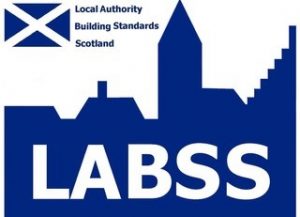Building Standards
Introducing the Competency Assessment System
December 17, 2020 by Michelle Williamson 4 Comments | Category Building Standards, Workforce
A guest post by Bob Renton, Consultant to Local Authority Building Standards Scotland, about the development of the Competency Assessment System and plans for implementation next year.
The Competency Assessment System, or CAS for short, has been developed over the last couple of years by Local Authority Building Standards Scotland (LABSS) with involvement from many people working in the building standards profession in different local authorities. The testing of prototype versions has ensured that the CAS has undergone changes to improve its usability and presentation in response to feedback. Work is underway to ensure the final version is in good shape to be launched for all staff from April 2021.

LABSS Logo
For the first time there will be a single and nationally consistent framework setting out the competencies required for everyone working in a building standards job. The key element is a series of job profiles that define the skill requirements for each role. From April, managers and staff will use the CAS to help individuals define their skills, identify any gaps and access opportunities to meet their learning and development needs. At this point, the CAS will be formally adopted by Scottish Government into the verification Operating Framework.
Flexibility for Local Needs
The CAS has been designed to cater for mainstream building types and issues. The competency levels have therefore been designed to capture most building activity. However, innovative and unusual building designs will always be produced. Where local conditions exist that require specific competencies, it is expected that these will be identified at local authority level with local knowledge which lies at the heart of the building standards system in Scotland.
Using the CAS
The CAS Toolkit is an interactive document that is used to complete a job profile for an individual member of staff. An initial assessment of their skills and competence by the job holder is the basis of a discussion with their line manager to agree existing competencies and any skill gaps that indicate development needs. The CAS Toolkit is used to identify possible in-house training options and external courses leading to accredited qualifications as appropriate.
The first year of operation will provide an opportunity for everyone to provide feedback on their experience of working with CAS. Improvements will be taken forward to ensure the final version from April 2022 meets the needs of all users and is an effective tool for the identification and development of professional competencies required in the building standards profession.
Further information
LABSS and BSD are working to ensure the CAS is ready to go live next April. Further updates will be shared as we get ready to the implement the CAS.
Tags: buildingregulations, buildingstandards

Being within the trade for many years delivering forklift training and always in and out of construction sites I do get to see a lot of work and I have to say the CAS scheme will definitely help to level up the quality of the work with the correct qualifications in place.
Good read up and I think these schemes also need to be put into place for private contractors.
Bhavesh Makwana
Direct Training
https://www.directtraining.co.uk/
Thanks for your comment Bhavesh.
My company does a lot of work in Scotland, in fact I was in Falkirk today looking at flood protection measures for a large commercial property. We would be interested in looking at your scheme but the danger is such schemes can be used by crooks to gain instant respectability rather than gaining respectability through years of hard work.
http://www.stormmeister.com
Hi Malcolm. Thank you for your comment. The CAS is exclusively for local authority staff working in a building standards job role. This delivers on a commitment in the workforce strategy to extend professional learning and development for all staff. The CAS is not for use by contractors or anyone working in a different part of the construction sector.